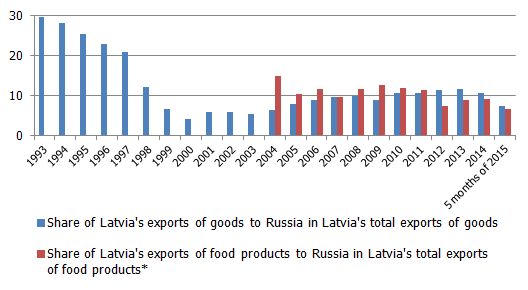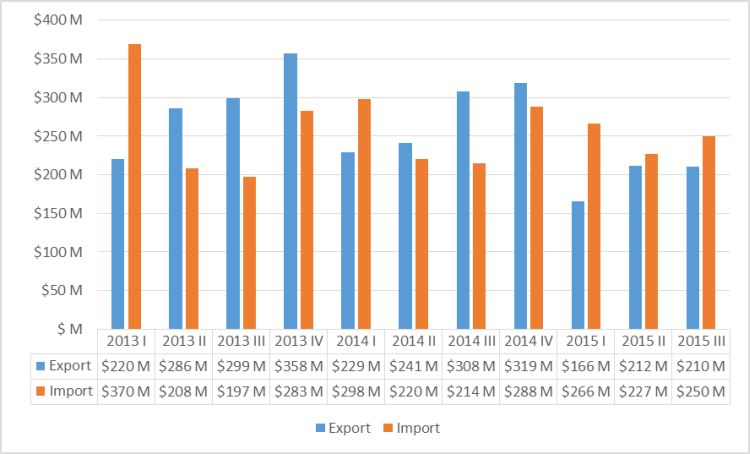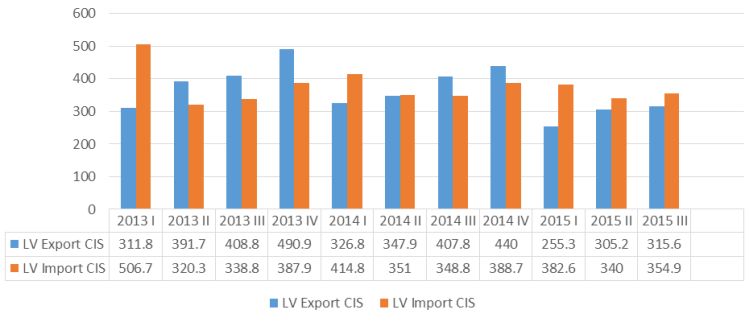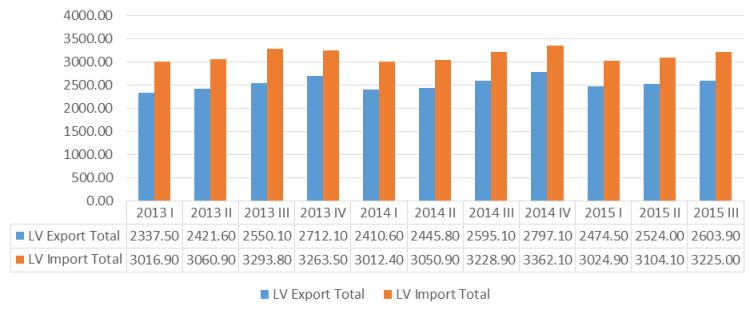Analytics, Baltic Export, Baltic States – CIS, Economics, EU – Baltic States, Markets and Companies
International Internet Magazine. Baltic States news & analytics
Thursday, 29.01.2026, 16:55
EU sanctions against Russia renewed: pros and cons for business and Baltics economy
 Print version
Print version
EU introduced its economic sanctions against Russia on July 31, 2014 as a response to Russia's involvement in the conflict in East Ukraine and Crimea. In spring 2015, the EU leaders decided to leave sanctions in place until a peace deal in Ukraine is fully implemented through the Minsk negotiations process; however, there are no feasible steps in making things better.
The sanctions imposed against Russia target generally the banking sector, defense and oil production technologies in import/export; sanctions also introduced a blacklist of about 150 Russian individuals who have been banned from entering EU and performing banking operations on its territory.
EU Council's decision underlined that “since the Minsk agreements were not fully implemented by Dec. 31, 2015, the duration of the sanctions would be prolonged whilst the Council continued its assessment of progress in implementation”.
Source: http://www.themoscowtimes.com/article/553470.html
Sanctions’ prolongation
Together with the EU, the United States and some other Western countries imposed sanctions against businesses and a number of Russian individuals in 2014, following Russia's annexation of the Crimean Peninsula from Ukraine. Later, the restrictions were extended.
The European Union has agreed to prolong the anti-Russian sanctions, but the decision will be officially announced later, sad Elmar Brok, the head of the European Parliament's foreign affairs committee.
The formal decision was made by the EU member states to extend the sanctions; the decision was connected to the implementation of the Minsk agreements.
The EU sanctions will be lifted only after full implementation of the Minsk agreements, aimed at stabilizing the situation in eastern Ukraine, said Mr. Brok.
“The most important sanctions, which were connected with the Ukrainian issue, will be removed immediately after full implementation of the Minsk agreements by both sides, including Ukraine, and when full territorial integrity and sovereignty of Ukraine's borders is provided,” Mr. Brok was quoted as saying by Interfax.
Last week, Italy blocked the automatic prolongation of anti-Russian sanctions and called for further discussion of the issue.
As to the US approach to sanctions, the American diplomatic service announced that such approach is “incredibly effective”. The difference with EU is that the US could introduce new economic sanctions against Russia over its alleged violation of the Intermediate-Range Nuclear Forces (INF) Treaty, the RIA Novosti news agency reported citing a top U.S. official.
“We continue to consider economic measures in connection with the INF Treaty, but we have not made a decision yet,” said U.S. Assistant Secretary of State for Arms Control Rose Gottemoeller, RIA Novosti reported.
The INF Treaty bans the production, storage or flight-testing of any medium-range missiles with a range capability of 500 to 5,500 kilometers. Washington claims that Russia violated the agreement by testing a missile in July last year (Moscow denied the accusations).
The US official added that the sanctions imposed on Russia by the US and the European Union in 2014 over its actions in the Ukraine crisis had been “incredibly effective”.
Retaliatory effect
Russian Prime Minister Dmitry Medvedev has signed a decree in mid-December 2015 on the introduction of a food embargo against Ukraine in response to the country joining anti-Russian sanctions, the Interfax news agency reported.
“Starting from 1 January 2016, Russia will extend the economic measures for Ukraine in connection with it joining anti-Russian sanctions by the European Union and the United States,” Medvedev said at a meeting with deputy prime ministers.
In August 2014, Moscow imposed a food ban on a wide range of food imports from EU, US, Norway, Canada and Australia in retaliation for the Western sanctions against Russia over its role in the Ukraine conflict.
In June 2015, Russia prolonged the ban for another year, following the extension of anti-Russian sanctions by the Western leaders.
In August, the Kremlin extended the food embargo to Albania, Montenegro, Iceland and Liechtenstein over their support of the anti-Russian sanctions. Regarding Ukraine, Russia said it would apply special conditions of embargo, which would come into effect in case Kiev agreed to an economic association with EU, but not later than from Jan.1, 2016.
Ukrainian Prime Minister A. Yatsenyuk estimated losses caused by the Russian embargo in 2016 at $600 million, the RBC newspaper reported in November 2015.
In mid-December 2015, Russia President V. Putin signed a decree suspending an agreement for a free trade zone between Russia and Ukraine; the measure also comes into effect on January 1, 2016.
Reference: http://www.themoscowtimes.com/article.php?id=553468
The Baltic States facing sanctions
The Baltic States traditionally relied on trade with Russia and the EU; though the share was in favor of trade with EU –about 70%, and about 15% for Russia.
The Baltic States got used to various “sanction-type” trade threats from Russia, e.g. import bans and other protectionist measures. For example, Russian import ban on Lithuanian dairy from October to December 2013.
Furthermore, in order to increase food security, Russian Agricultural Development Program for 2013-20 has planned a total of US$76 billion for the development of national agriculture and food markets.
Thus,
it is only logical that Baltic States producers move further away from Russian
markets, which they regard as both unpredictable and difficult in future.
 |
| Table 1. Latvian export to Russia |
Source: https://www.makroekonomika.lv/node/7685
As to Latvian export/import to CIS, the economic effect of sanctions might be exaggerated even through the post-soviet mistrust of the Baltic States towards Russia and its economic policy. The main drive of mistrust was due to political fair and efforts to reduce all sorts of dependence from East. For example, Nordea has estimated that the costs of sanctions could be 0.46% of GDP in Estonia, 0.44% in Latvia and 0.81% in Lithuania.
Source: https://nexus.nordea.com/research/attachment/17231
Affected by the sanctions, Latvian exports to Russia have
decreased by €64 million in the first quarter and by €98 million in the third
quarters of 2015. However, it is worth noting that imports from Russia to
Latvia in the third quarter have actually increased compared to the second
quarter (Table 2). The increase was caused by the increased import of mineral
products, such as oil and natural gas and by increased imports from chemical
and allied industries. Thus, even though the political climate is tense, Latvia
has no choice but to import more Russian gas for the winter.
 |
| Table 2. Latvian export and import to Russia, in € mln |
Source: https://www.makroekonomika.lv/node/7685
Latvian exports to CIS countries has fallen by €71 million in the first quarter of 2015 compared to the first quarter of 2014 and the gap has grown to € 92 million in the third quarter (see Table 3). This means that the sanctions had the effect of not only decreasing trade with Russia, but also with other CIS countries.
 |
| Table 3. Latvian export/import to CIS, mln € |
However,
there are good news. Even though Latvian exports to CIS countries have
suffered, the total exports of Latvia have grown in the same period by 64
million in the first quarter of the year and by 8.8 million in the third
quarter (see Table 4).
 |
| Table 4. Total Latvian export/import figures, mln € |
Source: https://www.makroekonomika.lv/node/7685
The
difference in the year-on-year changes between quarters leads to the conclusion
that the growth in the first quarter was due to Latvian exporters finally
reorienting towards other markets- something, that has been a long time coming.
Even though the EU has not seen sanctions on such a large scale for quite some time, the business community is deeply worried; and so are some European politicians, e.g. in Italy.
Conclusion
It seems that in the near future Latvian producers will not be either anxious or motivated on trade with Russia, rather relying on other, more stable markets. This means that, even if the sanctions end, most producers would bide their time before returning to the Russian market. Besides, some Russian companies have already invested in entering other markets worldwide.
Although Latvian exports to Russia fell by almost a third, this does not have such a drastic effect on the Latvian economy, as Latvian farmers/producers have – for quite some time – taken measures to reorient themselves away from the Russian market.
The reason why these sanctions are not so damaging for Latvian producers is because these are not the first trade barriers imposed on their trade with Russia.
Furthermore, the EU has taken steps to lessen the impact of the sanctions by providing €500 million in support for the affected farmers.
However, there have been strong expectations from the Latvian farmers’ side that a further €700 million would be available to complementary support and protect the farmers.
Source: http://bnn-news.com/massive-protest-act-brussels-gathers-4000-farmers-132726








 «The Baltic Course» Is Sold and Stays in Business!
«The Baltic Course» Is Sold and Stays in Business!

